Continuing with our study of Sheol in the Bible, Psalms, let’s consider this important question…
Did David Pray for His Ex-Friend to Go to a Hellish Torture Chamber?
Notice David’s statement in this passage:
PSALM 55:15 (KJV)
Let death seize upon them, and let them go down quick into hell (Sheol): for wickedness is in their dwellings, and among them.
David is obviously referring to his enemies in this text, yet it’s interesting to note that one of these enemies was once a very close friend of his. This is revealed in the preceding lines, verses 12-14 (as well as verses 20-21). At one time David had shared “sweet fellowship” with this person, but by the time of the writing of this psalm it appears that this one-time close friend had turned against him.
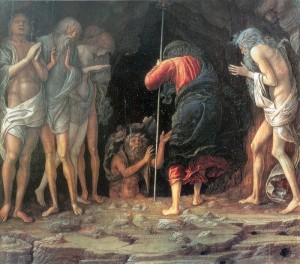 As you can see, Sheol is translated as “hell” in the King James Version and most English readers automatically view “hell” as a devil-ruled torture chamber for wicked human beings. This naturally presents a problem for such readers: How could David, “a man after God’s own heart,” pray for his enemies — including a former close friend — to go to such a place. Yet when we realize that Sheol — the word translated as “hell” her — refers to the graveyard of dead souls and, hence, the state of death itself, then all becomes clear as David’s prayer is in harmony with the law of God which plainly states that the “wages of sin is death” (Romans 6:23).
As you can see, Sheol is translated as “hell” in the King James Version and most English readers automatically view “hell” as a devil-ruled torture chamber for wicked human beings. This naturally presents a problem for such readers: How could David, “a man after God’s own heart,” pray for his enemies — including a former close friend — to go to such a place. Yet when we realize that Sheol — the word translated as “hell” her — refers to the graveyard of dead souls and, hence, the state of death itself, then all becomes clear as David’s prayer is in harmony with the law of God which plainly states that the “wages of sin is death” (Romans 6:23).
As a godly king of Judah, David knew that God’s Word promised his enemies would be defeated & destroyed (Leviticus 26:8; Deuteronomy 28:7) and he was praying in accordance with these promises. True, he was obviously torn-up inside because one of these enemies was once a dear friend, but this ex-friend and the others were trying to assassinate him, the righteous king of Judah, and David felt he had no other recourse.
This passage illustrates that a proper, biblical understanding of Sheol clears up passages that present serious problems for those who adhere to the view that Sheol is a torture chamber.
“My Life Draws Near to Sheol”
Heman the Ezrahite was facing a grave situation with the possibility of death in this psalm:
For my soul is full of troubles, and my life draws near to Sheol.
(4) I am counted among those who go down to the Pit; I am like those who have no help,
Psalm 88:3-4 (NRSV)
While this passage isn’t that notable it conveys several things detailed in other areas of SHEOL KNOW: 1. Heman links the destiny of his soul to Sheol, which verifies that (1.) Sheol is a condition of the soul and (2.) that the righteous as well as the unrighteous went there during Old Testament times (because Jesus hadn’t yet paid for human redemption and therefore spiritual regeneration wasn’t available). 2. Sheol and “the Pit” are synonymous. 3. Heman describes the location of Sheol in terms of “going down to the pit,” which coincides with other passages that show that Sheol is located in the “heart of the earth,” not in the physical realm, but in the spiritual realm. We’ll address this in Chapter Nine. 4. Heman says that his life was drawing near to Sheol, the Pit; and since Sheol is essentially synonymous with death (as shown in the next section) his life was drawing near to death.
“Who Can Live and Never See Death? Who Can Escape the Power of Sheol?”
Let’s observe what Ethan the Ezrahite had to say about Sheol:
PSALM 89:48 (NRSV)
Who can live and never see death? Who can escape the power of Sheol?
Here it is as plain as language can make it that death and Sheol are synonymous terms; in other words, the only thing souls going to Sheol will experience is death itself, the utter absence of conscious existence. The obvious implication of both rhetorical questions is that, apart from Christ’s redemption, everyone who lives will ultimately die and go to Sheol, the death state of the soul. Solomon also declared this:
ECCLESIASTES 7:2b
… for death is the destiny of everyman; the living should take this to heart.
Both of these texts were, of course, written during the Old Testament era before Jesus’ sacrifice for humanity was made; hence, no one living at this time had redemption from sin, regardless of whether or not they had a covenant with God, like the Israelites. Before Christ’s death and resurrection no one could escape the power of Sheol, whether moral, immoral or anywhere in between.
The good news is that this is no longer the case ever since Christ died for our sins and was raised to life for our justification (Romans 4:25). Jesus “poured out his soul unto death” (Isaiah 53:12 KJV) so that we don’t have to. As it is written: “For God so loved the world that he gave his only Son, so that everyone who believes in him may not perish but may have eternal life” (John 3:16 NRSV). You see, in order for the world — that is, all humankind — to be set free from death, someone innocent of sin and thus not worthy of death, had to die in our place. This is exactly what Jesus Christ did. So now when a born-again believer in Christ physically dies, his or her soul does not die, that is, go to Sheol, but rather goes straight to heaven. As it is written: “…to be absent from the body (is) to be present with the Lord” (2 Corinthians 5:8 KJV). Of course, this is only the intermediate state of the Christian soul; ultimately, the believer will receive a new glorified, spiritual, imperishable body at the bodily resurrection of the saints, called the first resurrection (1 Corinthians 15:42-43; Revelation 20:4-6).
I realize we’ve already gone over this information in this study so why am I emphasizing it again here? Simply to properly answer Ethan’s question: “Who can live and not see death? Who can escape the power of Sheol?” The answer is the Christian who has accepted God’s sacrifice for humanity’s sins, Jesus Christ; such believers literally possess eternal life in their spirits through spiritual rebirth (John 3:3,6,36), so even when they physically die Sheol has no power over them – hallelujah!
“If I Make My Bed in Sheol, You Are There”
Let’s examine another Psalm passage by David that comments on Sheol:
PSALM 139:7-8 (NRSV)
Where can I go from your Spirit? Or where can I flee from your presence? (8) If I ascend to heaven, you are there; if I make my bed in Sheol, you are there.
To properly understand what David is saying here we must consider the gist of the entire psalm (remember, “context is king”). In Psalm 139 David is completely awestruck as he contemplates God’s omnipresence and omniscience — that is, God being everywhere at the same time and knowing everything. David humbly realizes that he himself is finite while God, the Almighty Creator, is infinite. This awareness overwhelms him so much that he even states, “Such knowledge is too wonderful for me, too lofty for me to attain” (verse 6).
So, David’s words in verses 7-8 above are simply a poetic way of describing God’s omnipresence. Where can David go that God isn’t? The obvious answer is nowhere. Note how the New International Version renders this passage:
PSALM 139:7-8
Where can I go from your Spirit? Where can I flee from your presence? (8) If I go up to the heavens, you are there; if I make my bed in the depths (Sheol), you are there.
The NIV is a thought-for-thought translation and, as you can see, Sheol is rendered as “depths.” According to the NIV translators the thought of the passage is that, 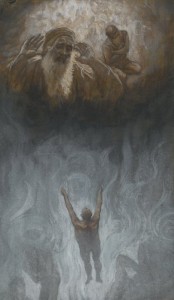 whether David goes far out into the universe or to the lowest depths of the earth, God is there. The translators evidently didn’t believe David was being very literal about the usage of Sheol here; he was just making a point about God’s omnipresence in an poetic manner.
whether David goes far out into the universe or to the lowest depths of the earth, God is there. The translators evidently didn’t believe David was being very literal about the usage of Sheol here; he was just making a point about God’s omnipresence in an poetic manner.
Yet, I don’t believe there’s any reason we shouldn’t take Sheol literally in this passage. God is everywhere. If David goes to heaven or to “the heavens,” the furthest reaches of the universe, God is there. If he makes his bed in Sheol, the LORD is there as well. God’s central presence isn’t, of course, in Sheol (He’s on his throne in heaven), but He is completely aware at all times of Sheol and of every dead soul housed there.
Notice David’s wording “make my bed in Sheol” as this is important to understanding the nature of the intermediate state for the unredeemed soul. David obviously believed that if he were to go to Sheol he’d essentially be in bed there or, we could say, asleep. This is in harmony with the repeated descriptions of souls in Sheol as “sleeping;” for example, Job’s statements as covered in Chapter Two.
Of course, souls in Sheol are not literally slumbering there, they’re dead. The only “sleep” they experience is the sleep of death.
This explains why David said in Psalm 6:5 that souls in Sheol cannot remember or praise God even though God is present there (due to His omnipresent nature):
Psalm 6:5 (NRSV)
For in death there is no remembrance of you; in Sheol who can give you praise?
This is a rhetorical question, which means the answer is obvious within the question itself. If God is present is Sheol, why are souls held there unable to either remember or praise Him? Obviously because they’re dead and lack conscious existence. They’re “asleep” in death. This is in complete harmony with the idea that Sheol is “the world of the dead;” it’s not the world of the living, it’s the world of the dead.
“Sleeping” in Sheol
As seen in Chapter Two, Job described the intermediate state in terms of sleep:
JOB 3:11-14
“Why did I not perish at birth and die as I came from the womb? (12) Why were there knees to receive me and breasts that I might be nursed? (13) For now I would be lying down in peace; I would be asleep and at rest (14) with kings and counselors of the earth who built for themselves places now lying in ruins,”
Let’s keep in mind that this passage pertains to the time before redemption was provided for humanity through Jesus Christ’s death and resurrection, hence, everyone shared the same fate when they physically died; no one could escape the power of Sheol back then. With this understanding, note how Job describes the condition he would experience if he had died at birth: He says that he would be “lying down in peace… asleep and at rest” with other people that died long before him.
Those who advocate that Sheol is a place of conscious existence would argue that Job is referring to his body sleeping in the literal grave and not to the soul sleeping in Sheol. Yet, notice that Job does not say his body would be asleep; he plainly states “I would be lying down in peace; I would be asleep and at rest.” Let’s remember that, from a purely biblical standpoint, the Judeo-Christian perspective is focused on the inner man, not the body. The apostle Paul even stated that an improper focus on outward appearance rather than the heart is “worldly” (2 Corinthians 5:12-17); in other words, doing such is the carnal or “human point of view” (NRSV), not the godly or divine point of view. Also, consider Jesus’ statement that we are not to fear people who can only kill the body, but not the soul; rather, we are to fear God Himself who is able to utterly destroy both body and soul in the lake of fire (Matthew 10:28). You see, a true man or woman of God’s outlook is geared toward the inward person, not the body; and, remember, Job was the most righteous man of God on the face of the earth during his time (Job 1: 1,3,8).
But, for the sake of argument, let’s consider the possibility that Job was, in fact, referring to his body when he stated that he’d be asleep if he died at birth; and, by contrast, his soul would be fully conscious in Sheol. Let’s read the passage as if this were so:
JOB 3:11-14 (altered to fit the view that Sheol is a place of conscious existence)
“Why did I not perish at birth and die as I came from the womb? Why were there knees to receive me and breasts that I might be nursed? For now I would be lying down in peace; I would be asleep and at rest with kings and counselors of the earth who built for themselves places now lying in ruins. (I’m, of course, referring to my body here. My soul — my real self — would be fully conscious in Sheol joyously hanging out with Father Abraham).”
Is this what Job really meant to say? Of course not. As you can see, altering the passage to fit the beliefs of those who insist that Sheol is a place of conscious existence renders it completely absurd.
Let’s observe a Psalm passage that describes the intermediate state of unredeemed souls in terms of sleeping:
PSALM 13:3 (NRSV)
Consider and answer me, O LORD, my God! Give light to my eyes, or I will sleep the sleep of death.
David’s life was in mortal danger here; if God didn’t save him he was going to die. Notice plainly how he describes the death condition he would experience if the LORD didn’t deliver him: “I will sleep the sleep of death.” Like Job, above, he wasn’t absurdly referring to his body here; he says “I will sleep the sleep of death” not “my body will sleep the sleep of death while I go to Sheol and enjoy fellowship with our holy patriarchs.”
Let’s observe two cases where Jesus Christ himself described the intermediate state in terms of “sleep:”
MATTHEW 9:18-19; 23-26
… a ruler came and knelt before him [Jesus] and said, “My daughter has just died. But come and put your hand on her, and she will live.” (19) Jesus got up and went with him, and so did his disciples.
(23) When Jesus entered the ruler’s house and saw the flute players and noisy crowd, (24) he said, “Go away. The girl is not dead but asleep.” But they laughed at him. (25) After the crowd had been put outside, he went in and took the girl by the hand, and she got up. (26) News of this spread through all that region.
Why did the people laugh when Jesus said the girl was “asleep”? Obviously because she was literally dead. She was indeed dead but Christ described her condition as sleeping. Why? Because her soul was in Sheol sleeping the sleep of death and he came to “awaken” her back to life.
This next passage involves the case of Lazarus’ death and subsequent resurrection by Jesus. The Lord is speaking at the start of the text:
JOHN 11:11-13
“Our friend Lazarus has fallen asleep; but I am going there to wake him up.”(12) His disciples replied, “Lord, if he sleeps, he will get better.” (13) Jesus had been speaking of his death, but his disciples thought he meant natural sleep.
(14) So then he told them plainly, “Lazarus is dead, (15) and for your sake I am glad I was not there, so that you may believe. Let us go to him.”
As you can see, Jesus says that Lazarus had “fallen asleep” and that he needs to go to him in order to “wake him up,” meaning resurrect him. But his disciples mistook 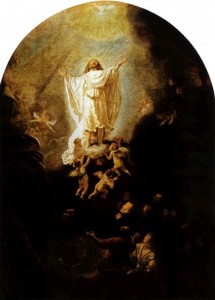 the Lord and thought he was talking about natural sleep. That’s when Jesus plainly tells them Lazarus had actually died. Verse 13 plainly reveals that the Messiah was speaking of Lazarus’ death when he said he had “fallen asleep” in verse 11.
the Lord and thought he was talking about natural sleep. That’s when Jesus plainly tells them Lazarus had actually died. Verse 13 plainly reveals that the Messiah was speaking of Lazarus’ death when he said he had “fallen asleep” in verse 11.
What I want to drive home in this section is that the Bible repeatedly describes the intermediate state of the spiritually dead soul in terms of “sleeping.” Both the Old and New Testaments do this. Even Jesus Christ himself, the living Word of God, did this.
What can we deduce from this? That when an unredeemed person dies, according to the Bible, his/her soul enters into the sleep of death. Again, this is not literal sleeping; it’s “the sleep of death” as David described it above in PSALM 13:3.
Most of us have heard the evangelistic declaration: “If you die today you will wake up in either heaven or hell!” Yet, if unredeemed souls are asleep in death in Sheol until their resurrection to face God’s judgment (Revelation 20:11-15), this slogan is only right on the first count. After all, souls can’t very well “wake up” in hell (i.e. Sheol) if they’re sleeping the ‘sleep’ of death. Jesus and the apostles never used inaccurate pronouncements like this in their evangelistic efforts, why should we? If you’re a Christian, let’s strive to be faithful to biblical truth!
Why are Souls in Sheol Referred to as “Sleeping”?
If souls in Sheol are dead, why are they repeatedly described as “sleeping” in the Bible? All who go to Sheol are, in fact, dead and have ceased to exist in the sense of conscious existence, but the Bible refers to them as “sleeping” because they will all one day be awoken or resurrected from this death. As briefly noted in the last chapter, this is what differentiates Sheol, the first death, from the lake of fire (Gehenna), which is the second death (Revelation 20:6,14; 21:8; 2:11). Everyone will be resurrected from the first death, but no one will be resurrected from the second death. This is why the second death is described as an “eternal punishment” (Matthew 25:46) or “everlasting destruction” (2 Thessalonians 1:9) because there is no hope of recovery or resurrection from it — it’s a fatal destruction of such complete and final magnitude that it lasts forever and ever.
‘Soul Sleep’?
Many of you have no doubt heard of “soul sleep” and may be wondering if that’s what I’m talking about here. Yes and no. ‘Yes’ because advocates of soul sleep believe, as noted above, that the soul is simply “sleeping” the sleep of death during the intermediate state between death and resurrection; they don’t believe the soul is literally slumbering while awaiting resurrection. ‘No’ because most adherents of soul sleep believe that the souls of spiritually regenerated people will also experience this condition of soul sleep during the intermediate state. As pointed out repeatedly in our study, this is simply not biblical. If people are born-again of the imperishable seed of Christ and, hence, possess eternal life in their spirits, why would they have to suffer death when their bodies perish? This explains why the apostle Paul wrote to the Corinthian believers that being absent from the body is to be present with the Lord (2 Corinthians 5:8). We’ll look at this issue in more detail in the chapter on The Believer’s Intermediate State.
The doctrinal label “soul sleep” is a good, brief and accurate description of the intermediate state of un-regenerated souls but I never use it for two reasons:
1. It gives the impression to the average person that the soul is still alive and merely dozing during the intermediate state.
2. The label is too closely related with cultic or marginally cultic groups with which I don’t want to be associated, and understandably so.
Some will inevitably argue: “If cultic or near-cultic organizations adhere in some form to the view that souls in Sheol are asleep in death and therefore not conscious, does this not automatically make this belief false or, at least, questionable? If nothing else, it doesn’t look good.”
This argument is addressed in detail in Chapter Six of HELL KNOW, under the heading Cults Teach Everlasting Destruction — It Just Doesn’t Look Good (scroll down), but allow me to briefly address it again here: Christians do not determine the veracity of a doctrine by whether or not an objectionable group adheres to it; they determine what is true and not true simply by finding out what the God-breathed scriptures clearly and consistently teach. If a doctrine is not clearly and consistently taught in the Bible, it is a false doctrine, regardless of what respectable person or group claims otherwise. Likewise, if a doctrine is clearly and consistently taught in the Bible then it’s a true doctrine, regardless of what questionable person or group agrees with it. This is in accordance with the theological principle of sola scripture, meaning “by Scripture alone,” which maintains that the God-breathed Holy Scriptures are the first and final authority regarding every judgment of Christian doctrine and practice.
Let’s face it, we all agree with cultic groups on some things; for instance, many cultic or borderline cultic organizations believe that the Bible is the inerrant Word of God. All authentic Christians, of course, believe this as well. Wouldn’t it be ludicrous to reject this belief simply because questionable groups agree with it?
Think about it like this: any person or group that steps outside of the blinding influence of erroneous religious tradition will easily be able to determine what the Bible clearly and consistently teaches on Sheol and the condition of souls held there during the intermediate state, as this study shows. This explains how various cultic or borderline cultic groups are able to discern the truth about the nature of Sheol — they weren’t blinded by human-made religious tradition.
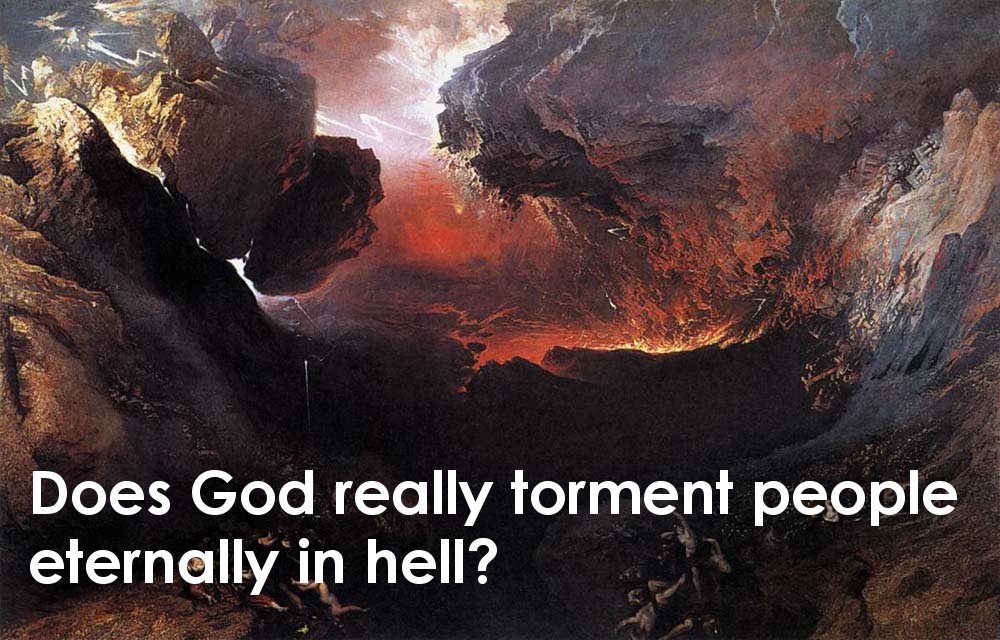
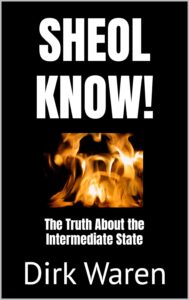
Julie from the Jungles of Oomba Boomba
Hi,
thanks for your article.
I would like to make a comment though.
You believe that the souls of the dead in Christ come with Him from Heaven( the rapture), bodies below; that then their bodies will rise, and still living believers be caught up together with their bodies to meet the Lord in the air?
But it says we we who are alive and remain shall be caught up together with them. The statement to, “that we who are alive and remain until the coming of the Lord will by no means precede those who are asleep,”does not go on to say, even by inference,’that they will precede us.’ Rather, “shall be caught up together with them in the clouds to meet the Lord in the air. ”
Also when it says that, surely it is talking of them, their souls, not the body which is the old vehicle.
thank you
Dirk Waren
Hi Julie.
Thanks for the feedback.
Your questions/points are addressed here with clear scriptural evidence. I also encourage you to check out Chapter 11 of SHEOL KNOW as well.
You’re welcome to write me further at dawaren@msn.com
Your Servant,
Tim
There are quite a few passages that lead me to believe even the saved “sleep” in death unless they are still alive at the return of Christ, though it’s true they come back to life 1000 years before the lost do.
For instance 1 Thessalonians 4:13-18
13 But I do not want you to be ignorant, brethren, concerning those who have fallen asleep, lest you sorrow as others who have no hope. 14 For if we believe that Jesus died and rose again, even so God will bring with Him those who sleep in Jesus.[b] 15 For this we say to you by the word of the Lord, that we who are alive and remain until the coming of the Lord will by no means precede those who are asleep. 16 For the Lord Himself will descend from heaven with a shout, with the voice of an archangel, and with the trumpet of God. And the dead in Christ will rise first. 17 Then we who are alive and remain shall be caught up together with them in the clouds to meet the Lord in the air. And thus we shall always be with the Lord. 18 Therefore comfort one another with these words.
I don’t believe there is any ghost like “soul” that leaves the body when the person dies, merely brain activity stops and it’s like being “reborn” and going to heaven when Christ returns. It will probably feel like dying and going immediately to heaven, save for the sudden jump into the future.
Dirk Waren
Hi Tim.
Thanks for your feedback.
There are a lot of people who adhere to literal destructionism who, like you, believe that even spiritually-regenerated believers go to Sheol to ‘sleep’ in death until their bodily resurrection. They usually hold to this position because the sect they belong to (or grew up with) officially advocates this position and it’s a matter of allegiance to their group. I’m not saying this is the case with you.
In any case, we don’t have to speculate about it because the Scriptures show us point blank that spiritually reborn believers are not subject to death except physically and thus our souls go to be with the Lord in heaven during the “intermediate state” between physical death and bodily resurrection. You can observe the evidence for yourself here.
As to the passage you quote, 1 Thessalonians 4:13-17, it’s a reference to the Lord’s return for his Church, also known as the “Rapture” (which is separate from the Lord’s Second Coming, detailed in Revelation 19:11-21). The second half of verse 14 of the passage you quote actually substantiates the position endorsed in SHEOL KNOW. The verse says that, at the time of the Rapture of the church, “God will bring with Jesus those who have fallen asleep in him.” Those who have “fallen asleep in him” is a reference to believers who have already physically died – their bodies “sleeping” in the dust. Notice that these believers will come with Jesus from heaven at the time of the Rapture. How so? Because that’s where they already are, not their bodies, but their souls!
Click that link above and honestly go over the material. It’ not a matter of one or two passages, but rather numerous clear passages showing that believers go to heaven in a disembodied state until their bodily resurrection.
Thanks again for your feedback, Tim.
God Bless You as You Seek & Serve!
Your Servant,
Dirk